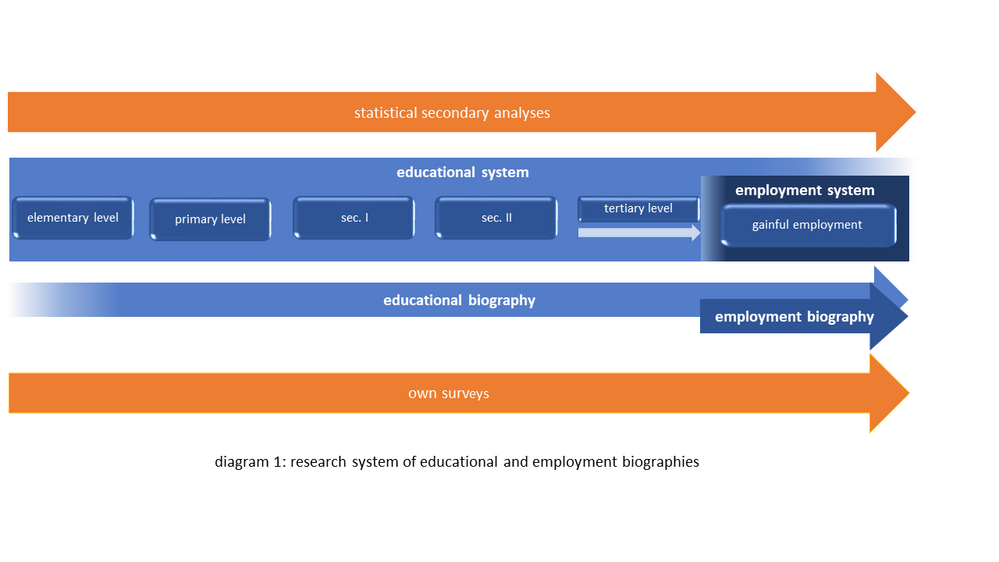BIOGRAPH
Educational and Employment Biographies in the Context of Mental Stress
Participation, Barriers, Prevention
People with mental stress face specific limitations and challenges throughout their entire life. Mental stress is a broad term used to describe disorders of behaviour and experience, which are perceived by the people affected and/or their environment (cf. Kranert 2020). In any case, these disorders lead to restrictions on participation possibilities. From a primarily pedagogical point of view, mental stress is understood as an expression of dysfunction of the interaction between the subject and its prevailing life situation (cf. Stein 2019). This approach on interaction opens up a multi-perspective access at the level of action. From a qualitative point of view, both externalizing and especially internalizing types of stress play an important role, as well as delinquent and age-inappropriate behaviour (cf. Maschker & Stein 2018, 63). Considering the quantitative dimensions of mental stress, at best approximations are possible, depending on the diagnostical categorization such as Special Educational Needs, with the focus on support of emotional and social development (KMK 2000; 2011), the subjective experience of stress (Klipker et al. 2018) or the mental disorder as a psychiatric concept (Falkai & Wittchen 2015; Richter et al. 2008). In principle, mental stress shows high prevalence rates in the population.
In order to prevent mental stress throughout all age groups, the understanding of both, the individual genesis and the dynamic development process in interaction with the social environment is of central importance as well as the reconstruction of the perception by third parties and corresponding personal and institutional reaction mechanism to this.
As a source of data and findings biographies of persons with mental stress can be taken into consideration; individual biographies of life, education and employment are thus brought into focus. In contrast to available selective investigations, e. g. on biographically relevant transitions (cf. Sabatella & von Wyl 2018; Stein, Kranert & Hascher 2020), the present research activity strives for an extensive longitudinal orientation. Biographical courses can be understood as a 'sequence of states and transitions' (Becker 2020, 65). "The focus is not on the individual, isolated events during life, but on the course of life as a sequence of social positions and roles as well as on status configurations (...) changes of position and status, thus transitions are a central part here (Becker 2020, 63; emphasis in the original). Therefore, transitions are important 'corner stones' and marker for the emergence, becoming visible, further development and effects of mental stress, disorders and diseases, especially from a preventive point of view. For this perspective the research of biographical life courses (cf. Wingens 2020) is an important point of reference.
There are a numerous longitudinal studies in various scientific subdisciplines, which present and analyse individual stages of life or transitions for all people or for certain subgroups (cf. for the transition school - work of the whole group for instance Eberhard et al 2014, for the subgroup of low educated people see Baas & Philipps 2019). According to the initial inspection of the research findings mental stress is rather marginally or at most selective considered in these biographically oriented studies (cf. Stein Hascher & Kranert - being prepared), the research gap is of obviously.
The research concept is dedicated to this comprehensive project in a series of interlinked substudies. For this purpose, courses of life with mental stress are analyzed in form of statistical secondary utilizations of existing data records as well as supplementary own surveys, in order to draw conclusions for the development and course of certain stress constellations from a preventive point of view (cf. diagram 1).
The following research questions, leading to action, are at the centre of attention:
- Which educational and employment biographies of people with mental stress can be retraced?
- Which patterns of interaction between psychological stress and the educational system with the implemented institutional transitions can be identified? Which stages of life or rather threshold-dependent specifications are reflected in the patterns of interaction?
- Which potential educational barriers result within as well as from the specific patterns of interaction between mental stress and the educational system? Which coping processes prove to be relevant?
- Which preventive settings (primary prevention) help to avoid or reduce barriers? Which secondary or tertiary specific offers support to cope with barriers in terms of "successful" educational and employment biographies?
Individual substudies are carried out in cooperation with the Medicine (University Professor Dr. med. Marcel Romanos, Clinic Director for Child and Adolescent Psychiatry, Psychotherapy and Psychosomatics University Hospital Würzburg ) and with the economics (University Professor Dr. Thomas Zwick, Chair for Human Resource Management and Organisation at the Julius-Maximilians-University Würzburg). Moreover, the German Center of Prevention Research in Mental Health at the Julius-Maximilians-University Würzburg is involved.
Term:
since January 2021
Funding institution

Human Dynamics Centre of the Faculty of Human Sciences (start-up financing)
Research unit
Univ.-Prof. Dr. phil. habil. Roland Stein
Hans-Walter Kranert, Academic Council
Philipp Hascher, academic staff
Contact
Julius-Maximilians-University Würzburg
Faculty of Human Sciences
Institute for Special Education
Chair of Special Education V
Wittelsbacherplatz 1
97074 Würzburg
phone: +49 931 31 84835
fax: +49 931 31 80073
e-mail: roland.stein@uni-wuerzburg.de






